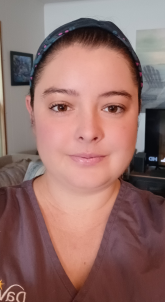“SMART” Ways to Stay On-Track with Healthy Holiday Eating

The holidays are rapidly approaching! And with
the return of bright lights, heart-warming tunes, cooler weather and our own
individual traditions comes … Gingerbread! Ham! And lots of other holiday
foods. Realistically, it can be very difficult for people with special dietary
needs, including people with kidney disease, to navigate the food scene during
the holidays. You may miss the foods you used to enjoy, or feel guilty when
friends and family bring foods you shouldn’t eat. Food is a huge part of many
cultures, traditions and values, and special dietary needs can feel challenging
and make it difficult to fully relax and enjoy your time with loved ones.
As the holidays and all their tempting foods arrive, here are some things to
keep in mind. First and foremost, know that your care team cares about you and
is there to support you. Reach out to them if you have questions about how to
stay on-track with your particular kidney diet through the holidays. Secondly, outside
of attending all your appointments and treatments, there are some strategies
you can use to help you have a healthy holiday season.
Set “SMART” goals
One strategy is simply to set goals for how you want your holiday season to look, in terms of your diet. These goals should be thorough and specific, otherwise they may start to derail despite good intentions. The “SMART goals1,2” technique is a guide for planning and achieving goals that you can use to help set yourself up for success. Each letter stands for a different part of the plan.
S stands for specific. This may be the most important part. It is very difficult to meet a goal that is too vague. For instance, saying, “I am going to keep my phosphorus under control,” is good. But a better, more specific goal would be to say, “I will only have 1/4 cup of my aunt’s casserole because it is always very cheesy.” Think about the specific holiday foods that are high in phosphorus or other nutrients you must limit, that you know will be tempting, and plan for how you will navigate that. Then, you can monitor your portions (for example, only having 1/4 cup of that cheesy casserole). Or, maybe you choose to stay away from it completely. You know yourself best and therefore are the best person to create goals that will work for you.
M stands for measurable. You have to be able to measure whatever your goal is to know if you have achieved it. An example of this might be to say, “Half my plate is going to be low-potassium vegetables.” In this case, the plate is your measuring tool. The measure doesn’t have to be complicated, it just has to be there.
A and R stand for attainable and realistic. These go hand in hand. Be realistic with yourself. Meeting yourself where you are is the only way you’ll be successful, and you are the most knowledgeable about that! It’s ok if your plan is not perfect, you are a work in progress.
T stands for time. What is your time frame for the goal? Only you know the answer to that question, but remember to be specific. Set a date. Do your goals start when the relatives leave? When you get your monthly labs? What is the right timeline for your individual holiday goals?
Summary
Let’s put it all together; here is an example of a SMART goal for holiday eating: “I will eat one piece of low-potassium fruit at lunch, make half my plate veggies at dinner, and have 8 ounces of fluid four times a day (making a check mark each time I do). I will do all of these until December 29 when I go back to my typical work week and schedule.”
Write it down and make it real. Put it in your calendar. Then follow the plan. DaVita.com also has tools that can help you manage your kidney diet, such as the Food Analyzer tool, Eating Out Guides and more. You got this!
Have a corn-tastic and sparkly holiday season!
- Beristain Iraola A, Álvarez Sánchez R, Petsani D, Hors-Fraile S, Bamidis P, Konstantinidis E. Virtual coaching for older adults at home using smart goal supported behavior change. Companion Publication of the 2020 International Conference on Multimodal Interaction. 2020. doi:10.1145/3395035.3425311
- Aghera A, Emery M, Bounds R, et al. A randomized trial of smart goal enhanced debriefing after simulation to promote educational actions. Western Journal of Emergency Medicine. 2018:112-120. doi:10.5811/westjem.2017.11.36524
Additional Kidney Diet Resources
Visit DaVita.com and explore these diet and nutrition resources:
DaVita Kidney-Friendly Recipes
This article is for informational purposes only and is not a substitute for medical advice or treatment. Consult your physician and dietitian regarding your specific diagnosis, treatment, diet and health questions.

Mollie is a new renal dietitian that has been with DaVita for one year with past varied experiences in clinical nutrition, as well as public health nutrition and education! Mollie enjoys working with patients, clients, and student, but also really enjoys the media side of nutrition and content creation. In her spare time Mollie enjoys being active, catching up with friends, and spending time with her pets. Mollie also enjoys trying new foods from other cultures.

Recent Comments